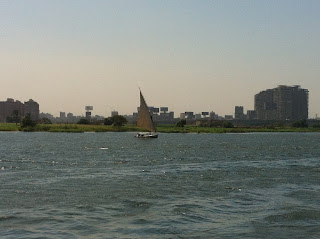Greater Good
Read Exodus 2:1-10.
I remember the moment we decided the time had come: we were ready (as ready as we could be) to move ahead in growing our family by having children. I remember the moments when both our kids were born: the excitement, the anticipation, the fear (especially the first time!), the joy and the pride of holding each one of them for the first time. Though they were both born into a changing world (and one that was about to change more than we ever suspected), the birth of both children filled us with excitement and wonder. A new generation was being born—what would they become?
I can't begin to imagine the world the baby in Exodus 2 was born into. In the chapter before, the king of Egypt (also known as Pharaoh) had ordered the death of all the Hebrew baby boys. His plan was born out of fear: the Hebrews had become so numerous, they would, he feared, outnumber the Egyptians and rise up against them. So kill all the boys, then there will be no more babies. (His plan, as are most such plans, is incredibly short-sighted. If there are no more babies, the Hebrew race will die out and he will, through simple aging and death, lose his work force. But most tyrants rarely think of these things.)
So this baby, nameless at first, is born under the shadow of genocide. He is born with a death mark on his life. Somehow, his mother keeps him hidden for three months but then it's obvious she can do so no longer and decides he is safer floating down the Nile River than he is in her own home. What kind of a setting leads a mother to make such a difficult decision? Perhaps it's that same protective instinct every mother has, to protect her child no matter the cost. Even if that cost is giving him up.
She doesn't know it at the time, but what she does is for the greater good of her people. Eighty years from now (probably long after she is gone), this baby will return to rescue the people from slavery and lead them to the land God has promised them. He will come back and help the people find their faith again. He will be the great deliverer, the redeemer, the people's hope.
And yet all his mother knows at this point is that she wants him safe, even if that means giving him up. Sometimes (often) the sacrifices we make, in God's timing, turn out for the greater good of far more people than we ever imagined. God works that way. God is good that way, taking the worst of human situations and, in his time (not ours), working them out for good (see Romans 8:28). Not every situation is good, but God will bring good out of every situation, life out of death, hope out of hopelessness. That's our Easter faith, that the worst thing (like putting your child in the Nile and sending him away) is never the last thing. God is a God of resurrection, hope and new beginnings!
 |
| Nile River, 2012 |
I can't begin to imagine the world the baby in Exodus 2 was born into. In the chapter before, the king of Egypt (also known as Pharaoh) had ordered the death of all the Hebrew baby boys. His plan was born out of fear: the Hebrews had become so numerous, they would, he feared, outnumber the Egyptians and rise up against them. So kill all the boys, then there will be no more babies. (His plan, as are most such plans, is incredibly short-sighted. If there are no more babies, the Hebrew race will die out and he will, through simple aging and death, lose his work force. But most tyrants rarely think of these things.)
So this baby, nameless at first, is born under the shadow of genocide. He is born with a death mark on his life. Somehow, his mother keeps him hidden for three months but then it's obvious she can do so no longer and decides he is safer floating down the Nile River than he is in her own home. What kind of a setting leads a mother to make such a difficult decision? Perhaps it's that same protective instinct every mother has, to protect her child no matter the cost. Even if that cost is giving him up.
She doesn't know it at the time, but what she does is for the greater good of her people. Eighty years from now (probably long after she is gone), this baby will return to rescue the people from slavery and lead them to the land God has promised them. He will come back and help the people find their faith again. He will be the great deliverer, the redeemer, the people's hope.
And yet all his mother knows at this point is that she wants him safe, even if that means giving him up. Sometimes (often) the sacrifices we make, in God's timing, turn out for the greater good of far more people than we ever imagined. God works that way. God is good that way, taking the worst of human situations and, in his time (not ours), working them out for good (see Romans 8:28). Not every situation is good, but God will bring good out of every situation, life out of death, hope out of hopelessness. That's our Easter faith, that the worst thing (like putting your child in the Nile and sending him away) is never the last thing. God is a God of resurrection, hope and new beginnings!


Amen!
ReplyDelete